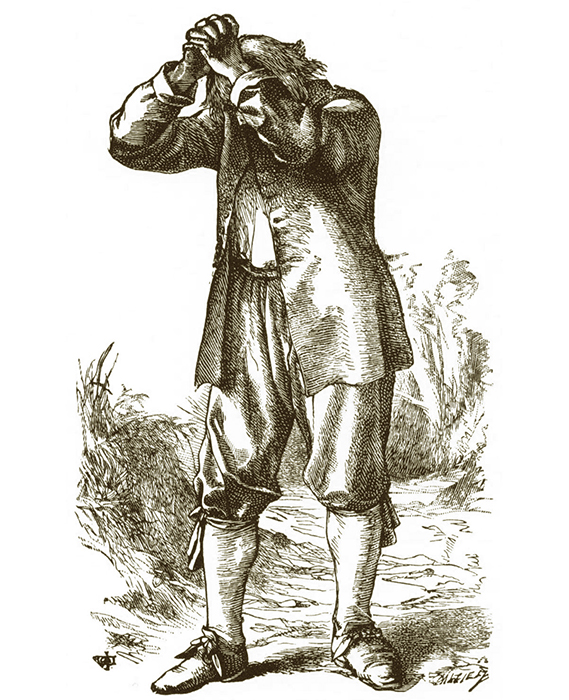Hopeful: But, Christian, these three fellows, I am persuaded in my heart, are but a company of cowards; would they have run else, think you, as they did, at the noise of one that was coming on the road? Why did not Little-faith pluck up a greater heart? He might, methinks, have stood one brush with them, and have yielded when there had been no remedy.
Christian: That they are cowards, many have said, but few have found it so in the time of trial. As for a great heart, Little-faith had none; and I perceive by you, my brother, had you been the man concerned, you are but for a brush, and then to yield.
And, verily, since this is the height of your stomach, now they are at a distance from us, should they appear to you as they did to him they might put you to second thoughts.
But, consider again, they are but journeymen thieves, they serve under the king of the bottomless pit, who, if need be, will come into their aid himself, and his voice is as the roaring of a lion. I myself have been engaged as this Little-faith was, and I found it a terrible thing. These three villains set upon me, and I beginning, like a Christian, to resist, they gave but a call, and in came their master. I would, as the saying is, have given my life for a penny, but that, as God would have it, I was clothed with armor of proof. Ay, and yet, though I was so harnessed, I found it hard work to quit myself like a man. No man can tell what in that combat attends us, but he that hath been in the battle himself.
Hopeful: Well, but they ran, you see, when they did but suppose that one Great-grace was in the way.
Christian: True, they have often fled, both they and their master, when Great-grace hath but appeared; and no marvel; for he is the King’s champion. But, I think, you will put some difference between Little-faith and the King’s champion. All the King’s subjects are not his champions, nor can they, when tried, do such feats of war as he. Is it meet to think that a little child should handle Goliath as David did? Or that there should be the strength of an ox in a wren? Some are strong, some are weak; some have great faith, some have little. This man was one of the weak, and therefore he went to the wall.
Hopeful: I would it had been Great-grace for their sakes.
Christian: If it had been, he might have had his hands full; for I must tell you, that though Great-grace is excellent good at his weapons, and has, and can, so long as he keeps them at sword’s point, do well enough with them; yet, if they get within him, even Faint-heart, Mistrust, or the other, it shall go hard but they will throw up his heels. And when a man is down, you know, what can he do?
Whoso looks well upon Great-grace’s face, shall see those scars and cuts there, that shall easily give demonstration of what I say. Yea, once I heard that he should say, (and that when he was in the combat), “We despaired even of life.” How did these sturdy rogues and their fellows make David groan, mourn, and roar? Yea, Heman, and Hezekiah, too, though champions in their day, were forced to bestir them, when by these assaulted; and yet, notwithstanding, they had their coats soundly brushed by them. Peter, upon a time, would go try what he could do; but though some do say of him that he is the prince of the apostles, they handled him so, that they made him at last afraid of a sorry girl.
Bunyan’s The Pilgrim’s Progress includes many contrasts. Christian escapes the City of Destruction (this fallen, sinful world) to journey to the Celestial City (the glories of heaven). Along the way he receives good counsel (Evangelist) and bad counsel (Worldly Wiseman). Bunyan distinguishes true converts (Christian, Faithful, Hopeful, Little-faith) from false converts (Simple, Sloth, Presumption, Formalist, Hypocrisy, By-ends, Turn-away, Ignorance).
Now, in contrast to Little-faith, we hear of another true and valiant pilgrim—Great-grace. The villains who robbed Little-faith fled in fear when they thought Great-grace might be nearby. Great-grace is the King’s champion. He is courageous, fit for battle, and adept at wielding the sword. He represents a vigilant believer or faithful pastor who is strong in faith, seasoned in spiritual warfare, and sympathetic to the needs of fellow Christians. He is one whom others can turn to in times of trial for godly counsel and encouragement. He knows the Word of God and is diligent in prayer. His strength is not in himself and his boast is not in his own works (Ephesians 2:8–9), but he lives to serve and glorify His King.
Not unto us, O Lord, not unto us,
But to Your name give glory,
Because of Your mercy,
Because of Your truth.
(Psalm 115:1)
He is clothed in the “whole armor of the Lord” and he stands in the strength of the Lord (Ephesians 6:10–20). He is “strong in the grace that is in Christ Jesus” (2 Timothy 2:1). William Mason explains:
Now here you see what is meant by Great-grace, who is so often mentioned in this book, and by whom so many valiant things were done. We read, “With great power the apostles gave witness of the resurrection of Jesus.” Why was it? Because “great grace was upon them all” (Acts 4:33). So you see all is of grace, from first to last, in salvation. If we do great things for Christ, yet, not unto us, but unto the great grace of our Lord, be all the glory.
The contrast between Great-grace and Little-faith highlights a significant truth. Not everyone is strong in faith. Not everyone has a “great heart.” We all have differing measures of spiritual strength and maturity. Christian tells Hopeful: “All the King’s subjects are not his champions, nor can they, when tried, do such feats of war as he. … Some are strong, some are weak; some have great faith, some have little.”
Hopeful wonders why Little-faith was not more courageous. Why did he not put forth more effort to stand? But Christian understands the true intensity of Little-faith’s trial. Hopeful is evaluating temptation from a distance, but Christian has experienced it close up. Little-faith was attacked by “journeymen thieves,” but Christian faced their master, who prowls about like a roaring lion:
Be sober, be vigilant; because your adversary the devil walks about like a roaring lion, seeking whom he may devour. Resist him, steadfast in the faith, knowing that the same sufferings are experienced by your brotherhood in the world (1 Peter 5:8–9).
When Christian faced Apollyon in the Valley of the Shadow of Death, he had the advantage of being dressed in the armor of God (Ephesians 6:10–20). He had been to House Beautiful, the church, and was strengthened by the preaching of the gospel. Even so, he found the battle to be arduous and his foe to be fierce.
Like Hopeful, we tend to underestimate the power of sin and treat it too lightly. Sin is a much more formidable foe when it is close and threatening. Seen from a distance it appears less intimidating. We gauge its strength across a wide field of battle and wonder: How could this be a struggle? I can handle this! Yet when the assault comes, the line is broken, and the enemy breaks through our defenses, the conflict can leave us beaten, battered and bruised, as it did Little-faith.
Even those who are great in grace are not immune to the scourge of battle. Great-grace bears the scars and cuts of combat on his face. Even he can be beaten down for a time. He must be alert and keep watch, for himself as well as for others in the Way. He must keep his weapons “at sword’s point” (unsheathed, in hand, and engaged in battle).
All of the King’s champions have faced times of trial. Peter was a target of the enemy (Luke 22:31) and was brought down by fear, even fear of a servant girl who recognized him and called him out (Luke 22:54–62). Paul was “burdened beyond measure” and “despaired even of life” (2 Corinthians 1:8). He regarded himself as the chief of sinners (1 Timothy 1:15). David was weighed down by his iniquities (Psalm 38:4–6). He confessed “my sin is always before me” (Psalm 51:3). Heman the Ezrahite cried out: “my soul is full of troubles” and “I am like a man who has no strength, adrift among the dead” (Psalm 88:3–5). Hezekiah was “sick and near death” and he “wept bitterly” (Isaiah 38:1–3).
If we see such bruises and scars on our champions, how much more seriously should we regard our fight against sin? We need to guard our hearts. We need to take up—
the shield of faith with which you will be able to quench all the fiery darts of the wicked one. And take the helmet of salvation, and the sword of the Spirit, which is the word of God; praying always with all prayer and supplication in the Spirit, being watchful to this end with all perseverance and supplication for all the saints (Ephesians 6:16–18).
This is a battle we can only win with our Bibles open (“at sword’s point”) and the promises of the gospel ringing in our hearts and minds.
The battle is hard because it is not a fight we can wage from a distance. It is not a fight we can wage on our own. The battleground is our own hearts and minds. Our fight is against sin and weakness within ourselves. Again William Mason explains:
Who can stand in the evil day of temptation, when beset with Faint-heart, Mistrust, and Guilt, backed by the power of their master, Satan? No one, unless armed with the whole armor of God; and even then, the power of such infernal foes makes it a hard fight to the Christian. But this is our glory, the Lord shall fight for us, and we shall hold our peace. We shall be silent as to ascribing any glory to ourselves, knowing our very enemies are part of ourselves, and that we are more than conquerors over all these (only) through HIM who loved us (Rom. 8:37).
Christ alone is our victory. We need His great grace if we are to prevail. He alone has power to conquer and defeat sin and death.
The sting of death is sin, and the strength of sin is the law. But thanks be to God, who gives us the victory through our Lord Jesus Christ. Therefore, my beloved brethren, be steadfast, immovable, always abounding in the work of the Lord, knowing that your labor is not in vain in the Lord (1 Corinthians 15:56–58).
A Guide to John Bunyan’s The Pilgrim’s Progress
See TOC for more posts from this commentary
The text for The Pilgrim’s Progress and images used are public domain
Notes and Commentary ©2018 Ken Puls
Unless otherwise indicated, all Scripture quotations are from the New King James Version (NKJV) ©1982 by Thomas Nelson, Inc.





